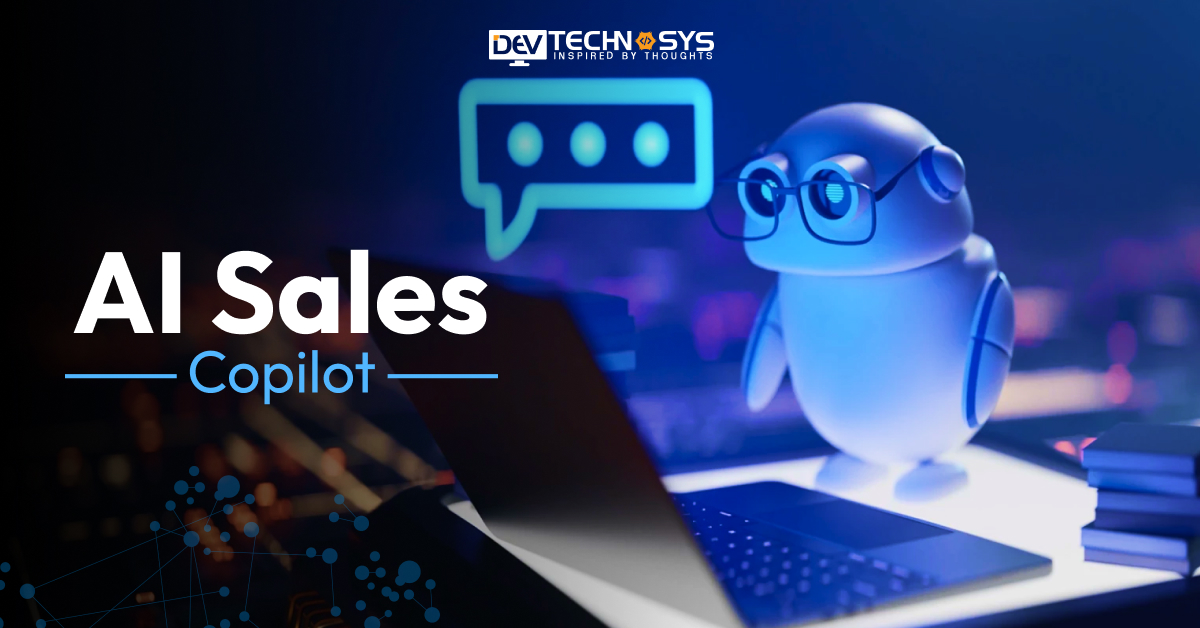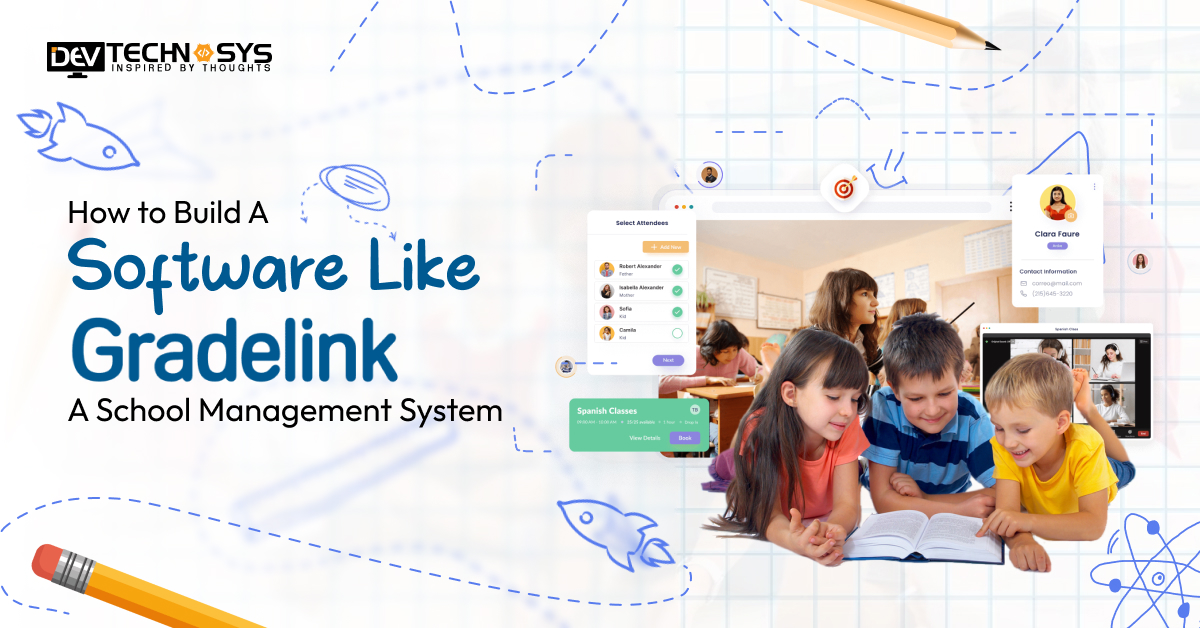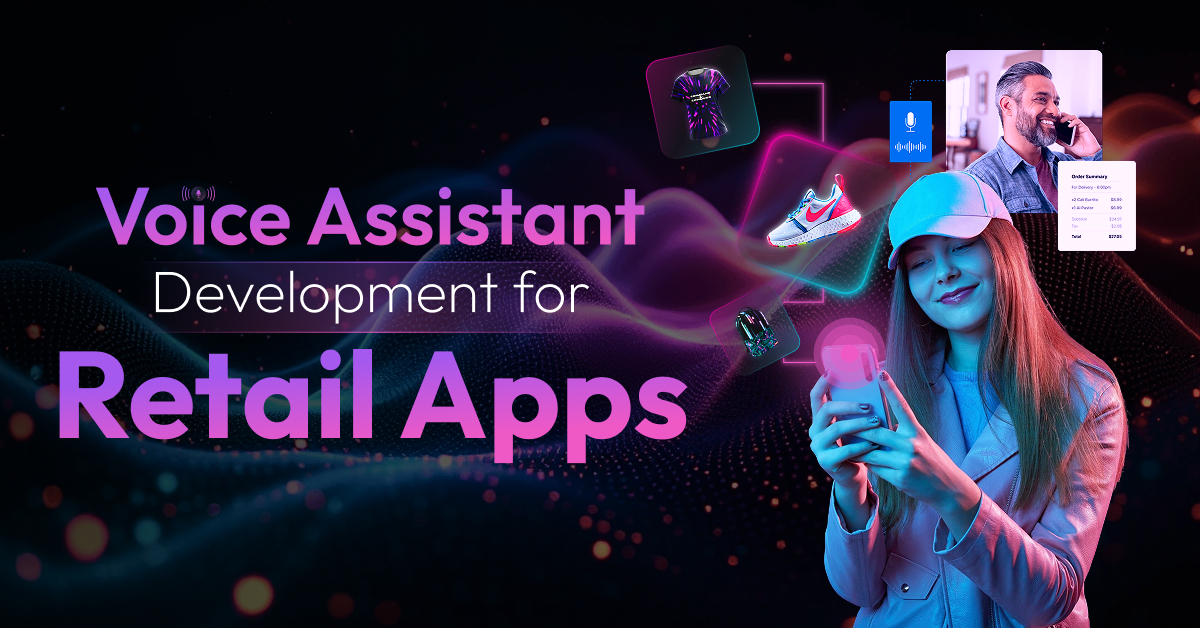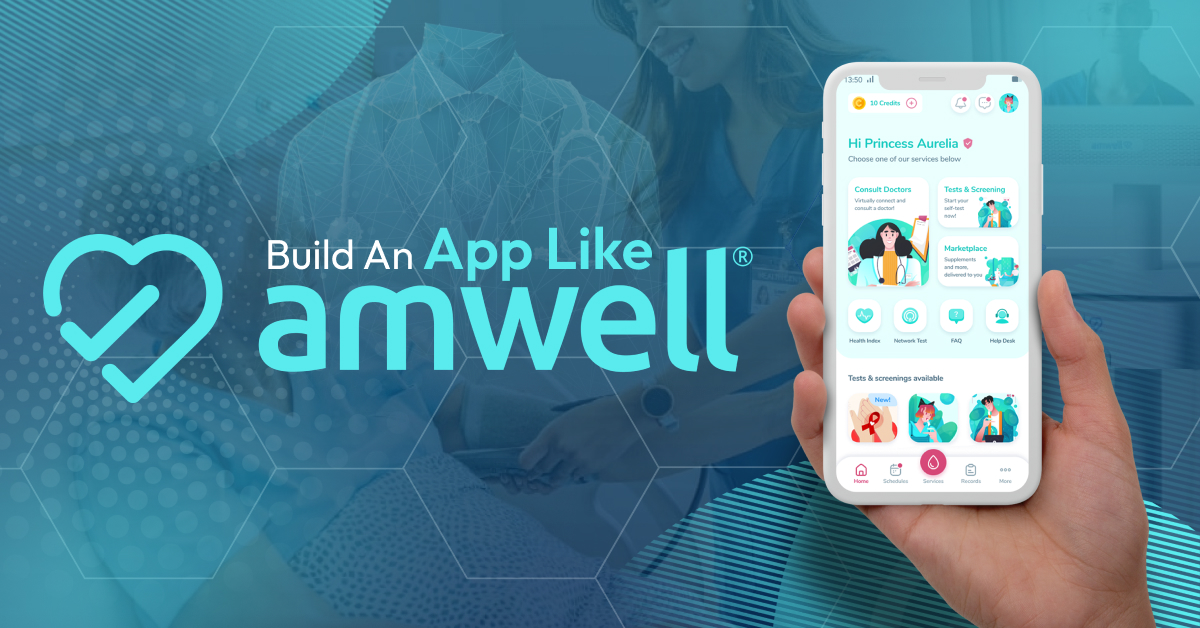“Improve your sales revenue model by implementing an AI Copilot.”
Do you know what is an AI Sales Copilot? If not, we are going to tell you everything about these AI assistant tools that are extensively used for sales and marketing. Various tasks like lead generation, record management, and data analytics have become easy with the use of these advanced tools. Businesses are eyeing to implement them in their existing systems.
For that, it is very important to understand each and every point related to the AI Copilot for sales. These tools can be used for all kinds of sales purposes like generating pricing models and creating interactive dashboards.
So, let’s move further in this blog to understand more about the tools and its working. Additionally, we will also discuss their applications and challenges.
What is an AI Sales Copilot?
An intelligent assistant that uses artificial intelligence to help sales teams at every stage of the sales process is called a copilot AI sales. It provides real-time insights, automates repetitive operations, analyzes data, and increases productivity.
A chatbot development company provides sales representatives to make data-driven decisions and close deals more quickly by integrating with CRM tools and communication platforms.
- Automates data entry, scheduling, and follow-up tasks
- Analyzes customer interactions to provide actionable insights
- Predicts deal outcomes and suggests next best actions
- Enhances sales forecasting accuracy using real-time data
- Assists in crafting personalized outreach and content
How Does an AI Sales Copilot Work?
An AI Sales Copilot assists sales teams in streamlining each step of the sales process. To improve decision-making and spur revenue growth, it integrates data collection, analysis, and automation:
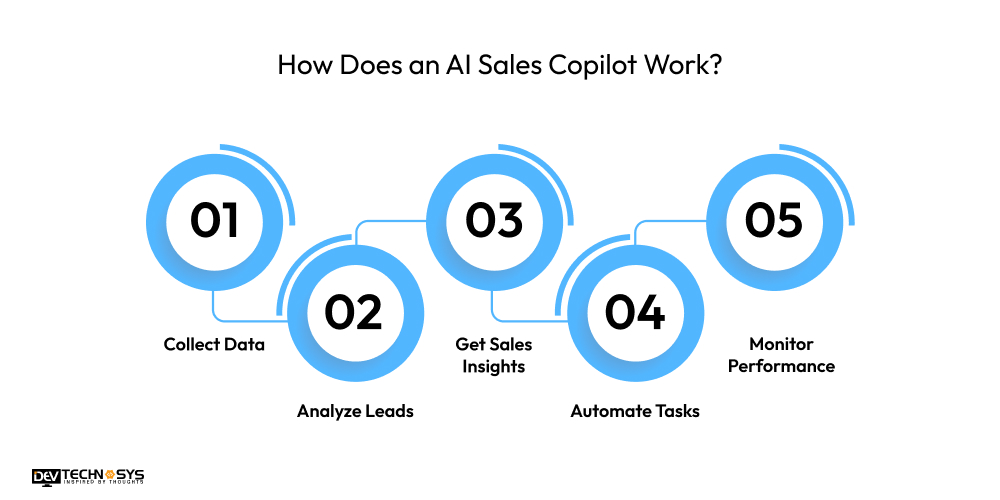
i. Collect Data
The AI copilot for sales collects information from calendars, calls, CRM systems, and emails. For contextual understanding, this includes past interactions, sales history, and consumer behavior.
ii. Analyze Leads
The copilot scores leads based on intent, engagement, and conversion probability using machine learning. By rapidly identifying high-potential candidates, it aids in outreach prioritization.
iii. Get Sales Insights
It provides useful information like when to reach out to leads or what to do next in a transaction. You can create an AI app to generate patterns, historical performance, and market behavior for insights.
iv. Automate Tasks
Data entry, follow-ups, and organizing meetings are examples of routine jobs that are automated. Sales representatives may now concentrate on developing relationships and closing deals.
v. Monitor Performance
A sales AI copilot uses real-time dashboards, monitors KPIs, deals progress, and represents productivity. Based on past benchmarks, it also recommends enhancements for regions that are performing poorly.
What are the Benefits of Using an AI Sales Copilot?
An AI Sales Copilot is a potent tool that automates procedures and provides useful information. It streamlines workflows and enhances overall sales performance:
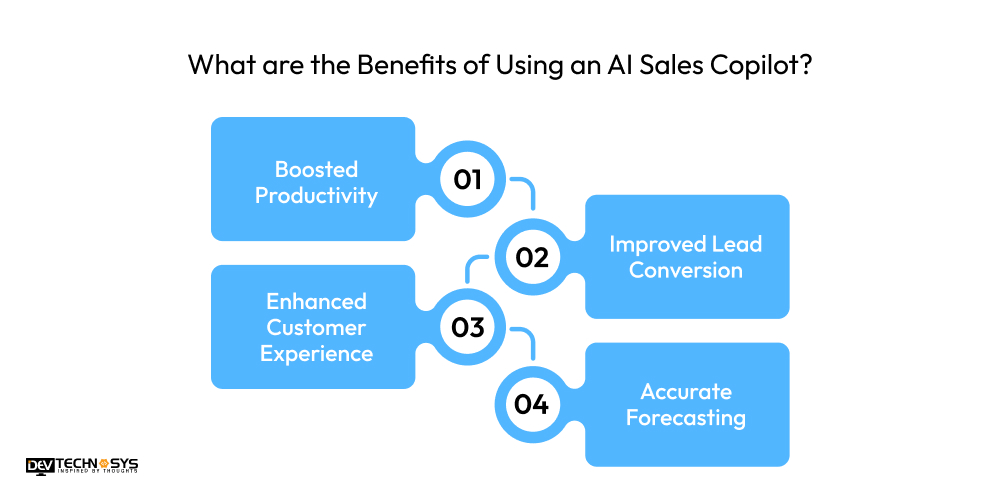
1. Boosted Productivity
Data entry, follow-ups, and CRM updates are among the tasks that AI copilots for sales and marketing automate. Weekly time savings allow sales representatives to devote more time to client connections and strategic selling. More closed deals and quicker pipeline movement result from this.
2. Improved Lead Conversion
The AI makes recommendations for the most promising leads by examining lead behavior and engagement. A mobile app development firm suggests timing and tailored outreach tactics to boost response rates. Better targeting and noticeably improved conversion rates are thus guaranteed.
3. Enhanced Customer Experience
Before every encounter, reps receive context-rich information from AI tools. This makes it possible to have tailored discussions that are relevant to the needs and background of the prospect. Long-term client loyalty and trust are increased by such customized interaction.
4. Accurate Forecasting
To forecast future revenue, AI copilots examine sales velocity, deal advancement, and previous data. Managers can create reasonable targets and make well-informed decisions with the aid of these insights. Accurate forecasting enhances strategic planning and resource allocation.
Exciting Features of AI Sales Copilot
An AI Sales Copilot is made to increase productivity and optimize sales processes. These solutions enable teams to sell more quickly and intelligently, from lead scoring to real-time coaching:
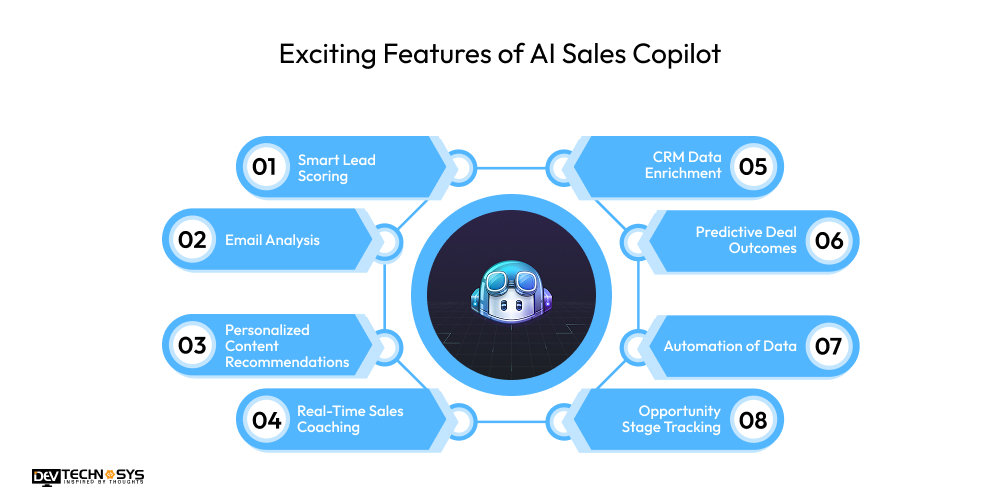
-
Smart Lead Scoring
A sales copilot AI evaluates and ranks leads using AI algorithms according to various information. This guarantees that sales representatives give top priority to the most promising conversion chances.
-
Email Analysis
It evaluates engagement data, email content, and tone to improve communication tactics. This may offer suggestions for improved timing, topic lines, and follow-up strategies.
-
Personalized Content Recommendations
An AI assistant suggests material that is specific to the lead’s industry, behavior, or funnel stage. Sales pitches become more relevant and engagement increases as a result.
-
Real-Time Sales Coaching
During meetings or sales calls, make spontaneous recommendations. It teaches representatives how to handle objections, how to be polite, and how to improve their performance.
-
CRM Data Enrichment
AI-powered sales tools automatically update and complete missing information from third-party sources. Businesses can use AI consulting services to maintain CRM systems current, correct, and tidy.
-
Predictive Deal Outcomes
An intelligent sales assistant uses past data, buyer signals, and ongoing engagement to predict the chance of a sale closing. It helps representatives and managers to concentrate on the negotiations and deadlines.
-
Automation of Data
It removes the need for manual entry by gathering information from emails, calendars, and discussions. This guarantees data consistency across platforms and boosts efficiency.
-
Opportunity Stage Tracking
AI Copilot for sales monitors the status of deals and identifies pipeline delays or bottlenecks. It provides information to help take preventative measures and keep deals going.
Interested in a chatbot demo, pricing, or more info? Fill out the form our expert will contact you shortly.
-
Chatbot Demo
-
Cost to Develop an app
-
Industry Report
-
Case Study
Additional Features of AI-Powered Sales Assistant Tools
AI-powered sales assistants offer advanced features that boost sales tactics. These capabilities make it easier for teams to make data-driven decisions, sell more intelligently, and react more quickly:
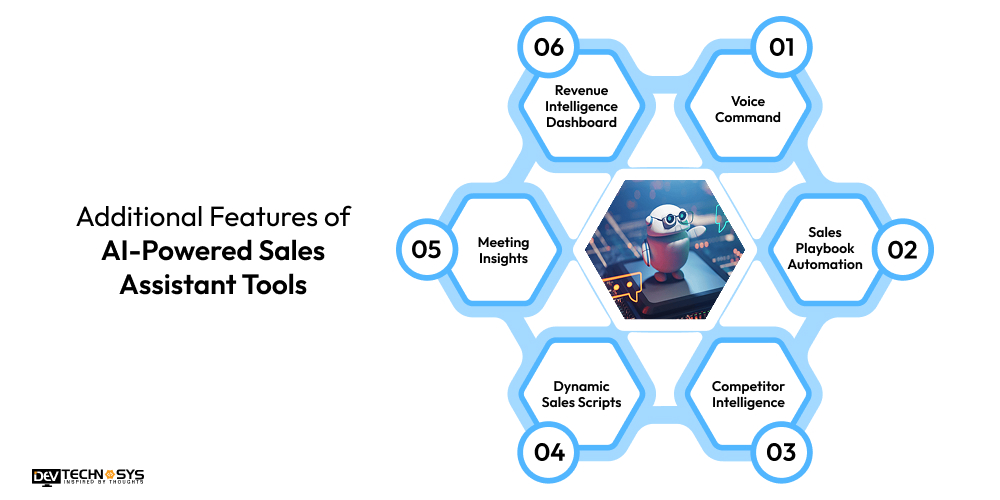
-
Voice Command
It enables vocal interaction between sales representatives and the AI assistant for various tasks. This increases productivity without using your hands, particularly when in meetings or on the go.
-
Sales Playbook Automation
AI-powered B2B prospecting tools for sales provide customized sales playbooks according to the history of the customer. This guarantees the sales team’s strategy alignment and consistent messaging.
-
Competitor Intelligence
It monitors and evaluates the activities of competitors through news, digital media, and buyer conversations. This uses real-time placement methods to assist representatives in pitching.
-
Dynamic Sales Scripts
This creates flexible sales scripts using historical engagement data and real-time customer input. By using ChatGPT integration services, you can easily manage objections and tailor discussions.
-
Meeting Insights
Sales productivity tools highlight important subjects, action items, attitude, and buyer indications by analyzing calls. It improves follow-through and saves time by generating summaries and next steps.
-
Revenue Intelligence Dashboard
This combines sales data to show forecast accuracy, win rates, and performance trends. It gives decision-makers a broad perspective on the state of sales and potential for expansion.
How Revenue is Earned Through AI Sales Copilot?
AI Sales Copilots make money using a variety of monetization tactics. While providing sales teams with ongoing value, these approaches assist providers in scaling their offerings:
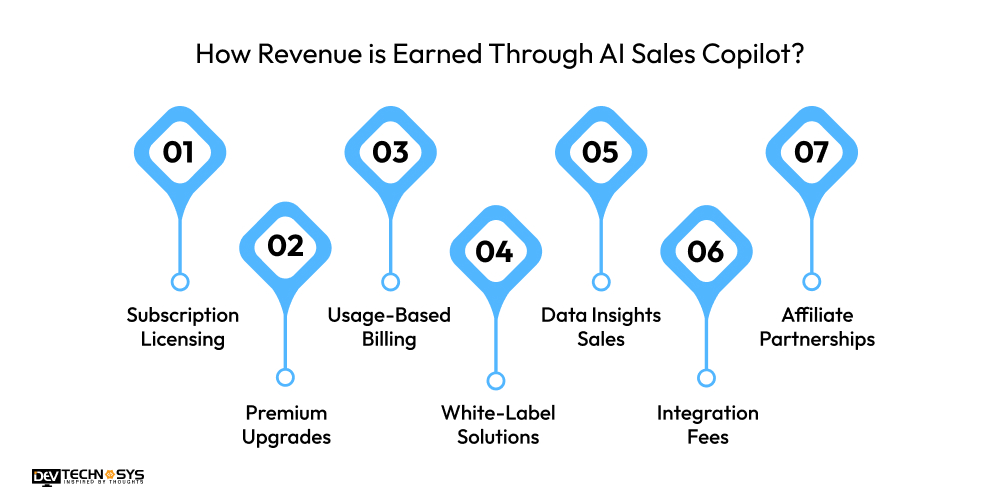
1. Subscription Licensing
To have access to the AI Sales Copilot platform, customers must pay a recurring monthly or annual charge. Predictable revenue growth with AI is guaranteed by this strategy, which frequently has tiers of plans according to features or user count.
2. Premium Upgrades
While advanced features like analytics, integrations, or automation necessitate a premium tier, basic plans are available with limited features. These capabilities can be unlocked by users via enterprise plans or additional charges on the sales AI tool.
3. Usage-Based Billing
The amount of revenue is determined by the customer’s usage of the platform, including the quantity of interactions, API calls, and insights produced by AI. This methodology scales with company usage and matches pricing to the actual value supplied. It is perfect for businesses with erratic or heavy usage.
4. White-Label Solutions
In order to enable other companies to brand and market their AI Sales Copilot, vendors provide it under a white-label approach. Partners who desire a custom-branded solution without starting from scratch can use machine learning development services. It produces B2B licensing fees and broadens the reach.
5. Data Insights Sales
User interaction data that has been aggregated and anonymized can be packaged into benchmarks or market insights and sold to outside parties. Research companies, analysts, and sales executives can all benefit from AI for sales and marketing.
6. Integration Fees
In order to link the AI Copilot with their CRM, ERP, or other systems, customers may be assessed one-time or ongoing costs. Custom setup, API development, and deployment help are all included in these rates. For enterprise clients with intricate requirements, this paradigm is particularly pertinent.
7. Affiliate Partnerships
The AI Copilot makes money through collaborations in which it integrates or markets third-party solutions in exchange for commissions on sales or referrals. Without creating new features through sales automation with AI, this broadens the range of services offered and creates new revenue streams.
Applications of AI-Based Sales Tools
By integrating intelligence routine sales procedures, AI-based sales solutions are revolutionizing sales. For steady growth, they increase client engagement, anticipate better, and expedite lead handling:
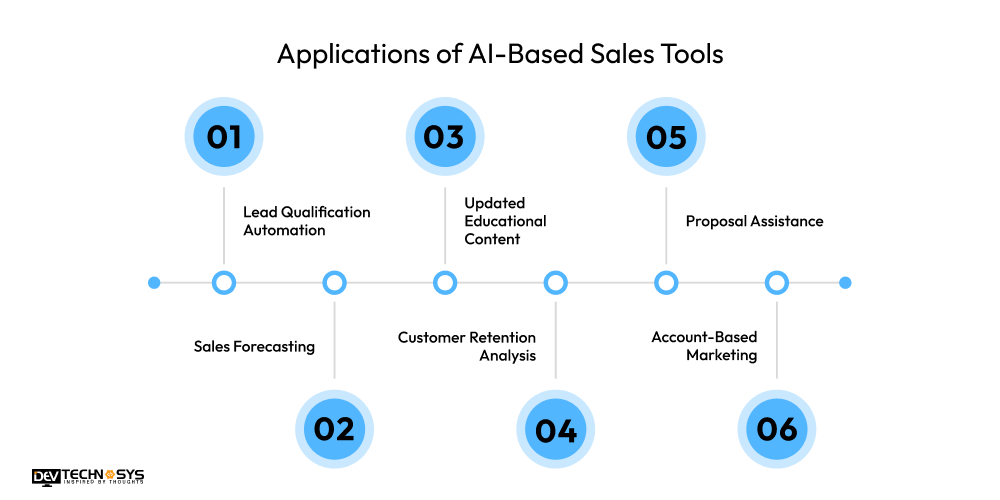
1. Lead Qualification Automation
AI-powered sales solutions use engagement data, demographics, and behavior to assess the quality of leads. They assist sales representatives in concentrating solely on high-converting prospects by automatically ranking and prioritizing leads.
- Predictive Accuracy: Uses data models to score and prioritize leads.
- Real-Time Filtering: Instantly updates lead scores based on behavior and interaction changes.
2. Sales Forecasting
AI chatbots for sales assistance help to forecast future revenue, examine past data, deal velocity, and provide real-time interaction. It helps sales leaders to minimize pipeline uncertainty, maximize resources, and make well-informed decisions.
- Data-Driven Precision: Analyzes historical and real-time data to forecast revenue accurately.
- Scenario Modeling: Allows for simulations and trend analysis based on different variables.
3. Updated Educational Content
AI selects and provides representatives with the most recent product updates, competitive analysis, and sales strategies. By availing chatbot development services the sales crew is guaranteed to remain knowledgeable and promptly adjust to shifting market conditions.
- Personalized Learning: Delivers content tailored to each rep’s role, skill level, or industry focus.
- Continuous Updates: Automatically refreshes materials based on product changes.
4. Customer Retention Analysis
AI identifies at-risk clients by analyzing user behavior, feedback, and support interactions. It offers analysis and suggestions for proactive retention tactics that lower attrition.
- Churn Prediction: Identifies early warning signs of potential customer drop-off.
- Behavior Insights: Monitors usage patterns and engagement to guide retention efforts.
5. Proposal Assistance
AI sales automation pulls exclusive case studies, pricing, and content to create personalized sales pitches. It ensures professionalism and uniqueness while expediting the proposal process.
- Content Personalization: Auto-generates proposals customized to the client’s needs.
- Time Efficiency: Drastically reduces manual effort in assembling documents and pricing.
6. Account-Based Marketing
AI uses behavioral and firmographic data to categorize and target high-value accounts. It coordinates marketing and sales initiatives to develop tailored campaigns that increase engagement and conversions.
- Target Precision: Identifies and segments high-value accounts based on intent data.
- Campaign Alignment: Coordinates sales and marketing across channels.
Top 5 AI Sales Copilot
By fusing automation, analytics, and real-time support, AI sales tools are revolutionizing team function. These are the top five AI-powered solutions that enable transactions more quickly and generate revenue:
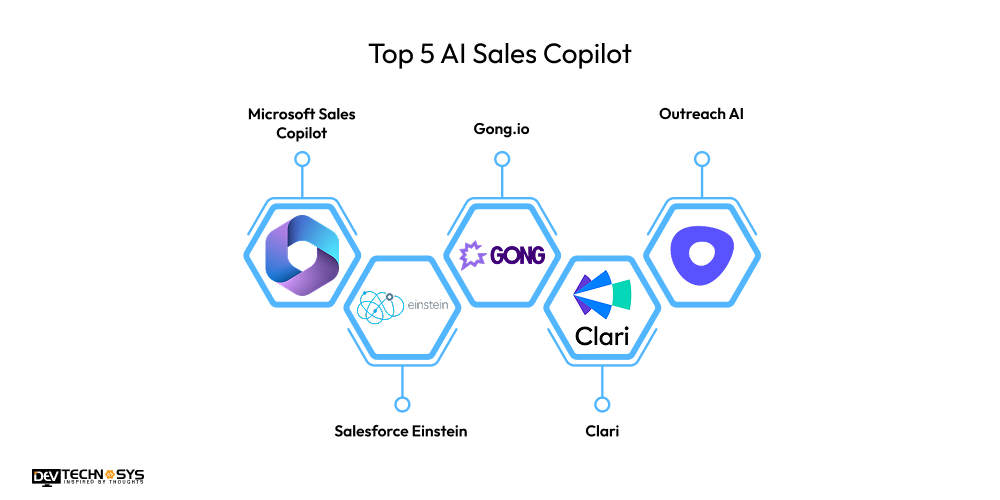
1. Microsoft Sales Copilot
With its direct integrations with Dynamics 365 and Microsoft 365, Microsoft Sales Copilot provides real-time data and recommendations. It is an AI sales assistant helping sellers to remain productive with AI-generated meeting summaries, CRM updates, and smooth Outlook/Teams interactions.
- Contextual AI Assistance: Provides updated suggestions for sales by analyzing CRM data.
- Automated Task Management: Helps automate follow-ups, and data entry.
2. Salesforce Einstein
Salesforce’s integrated AI Copilot for sales, Einstein, provides forecasting, opportunity insights, and predictive lead scoring. Within the Salesforce ecosystem, it assists sales teams in personalizing interactions, automating workflows, and making data-driven decisions.
- Predictive Lead Scoring: Uses AI to rank and prioritize leads for conversion.
- Opportunity Insights: Delivers AI-driven insights about deals to accelerate the sales cycle.
3. Gong.io
Gong.io analyzes emails, meetings, and sales calls using AI to glean deal intelligence and actionable insights. By using AI development services, it provides pipeline insight, real-time coaching, and customer interaction-based performance enhancement for representatives.
- Conversation Intelligence: Analyzes sales calls and meetings to record talk patterns.
- Deal Risk Identification: Detects potential deal risks by monitoring communication signals.
4. Clari
Clari is a revenue operations platform that tracks pipeline flow, forecasts sales, and minimizes revenue loss using artificial intelligence. Better sales execution is made possible by the strong visibility it provides leadership teams into deal progress and performance hazards.
- Pipeline Management: Uses AI to provide accurate forecasting and real-time visibility.
- Activity Tracking: Automatically tracks sales activities to help managers keep deals on track.
5. Outreach AI
Outreach is an AI assistant for sales that allows conversation intelligence, engagement tracking, and intelligent sequencing. With AI-powered recommendations, it helps representatives keep on top of responsibilities, customize at scale, and speed up transaction cycles.
- Automated Sales Sequences: Creates personalized workflows to increase response rates.
- AI-Powered Email Suggestions: Provides smart email content to improve communication.
Integrate AI Sales Copilots With CRM Tools
Sales efficiency is increased, workflows are automated, and real-time insights are unlocked through CRM AI integration. A smooth integration guarantees data consistency and facilitates decision-making:
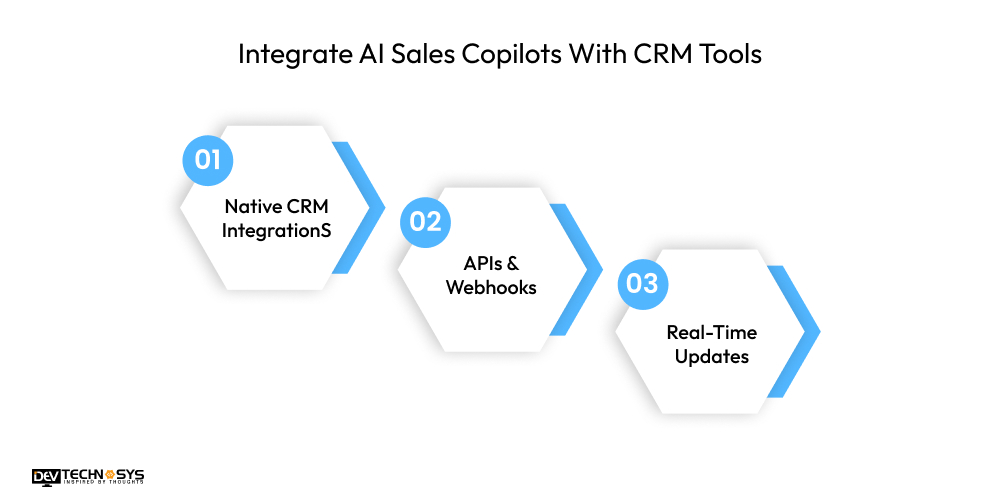
1. Native CRM Integrations
Popular CRMs like Salesforce, HubSpot, and Microsoft Dynamics have built-in connectors with many top AI Sales Copilot tools. With little technical work needed, these native connectors streamline the setup procedure. They make in-platform functionality, contextual insights, and automatic data syncing possible.
AI-powered suggestions are available to users from within their CRM interface. Sales teams may remain productive without hopping between tools thanks to this close conneai sales copilotctivity.
- Does the AI sales copilot offer native support?
- What functionalities are available to integrate the CRM interface?
- How does the native integration sync data between the AI tool and the CRM?
2. APIs & Webhooks
Custom interfaces between AI copilots and a business’s distinct CRM or IT stack are made possible by APIs and webhooks. While webhooks deliver real-time updates in response to particular triggers, APIs allow two-way data exchange.
These tools give you the freedom to alter data flows, event handling, and processes. An AI development company may help you to modify the integration with improved sales procedures.
- Can the AI sales copilot support sales workflows?
- What types of events can trigger webhooks
- Are there rate limits or restrictions on the volume of API calls?
3. Real-Time Updates
Data, insights, and suggestions are always current thanks to real-time syncing between AI copilots and CRMs. This makes it possible to respond quickly to changes in leads, customer interaction, or deal status. AI assistants are able to respond to new inputs instantaneously, providing pertinent content or prompts.
It reduces the delay between the creation of insights and user reaction. Proactive selling and accurate forecasting are facilitated by real-time updates.
- How quickly does the AI copilot reflect changes?
- Can real-time insights be integrated with CRM dashboards?
- What safeguards are used to ensure data accuracy?
Challenges With Advanced AI Sales Assistants
AI sales assistants have many useful features, but there are a number of drawbacks. To properly utilize AI in the sales process, businesses need to overcome three challenges:
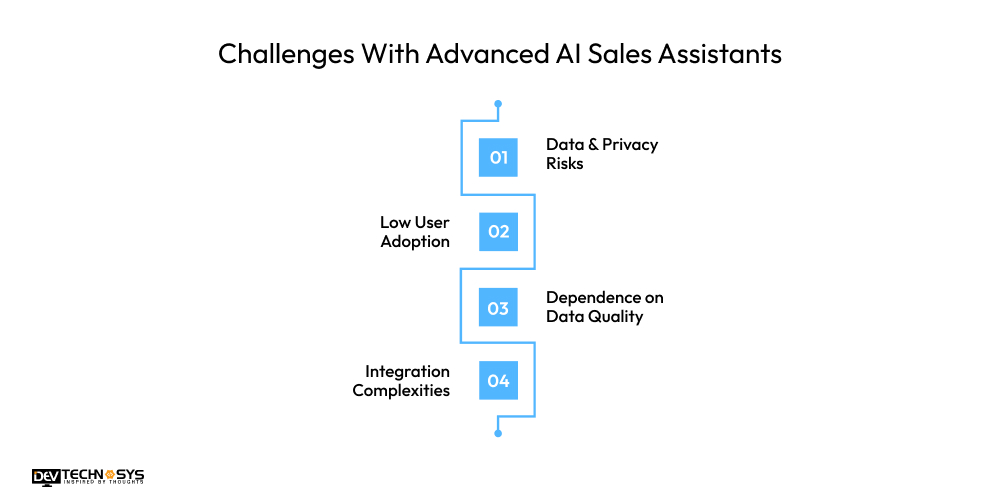
1. Data & Privacy Risks
Sensitive client data is frequently needed for sales enablement AI tools, which raises questions about illegal access. Legal problems and a decline in customer trust might result from improper data handling.
Solution: Put in place robust data governance procedures and make sure AI technologies abide by pertinent data protection laws.
2. Low User Adoption
The implementation of AI may be resisted by sales teams because of perceived complexity, lack of training, or lack of trust. This increases the cost to develop a chatbot due to unused tools.
Solution: Involve sales representatives early in the AI deployment process, give them practical training, and clearly illustrate the benefit of the technology.
3. Dependence on Data Quality
The accuracy and completeness of input data are crucial for AI performance, while incomplete data produces subpar results. Predictions and suggestions may be distorted by inaccurate or out-of-date facts.
Solution: To ensure consistent, high-quality data inputs, use routine data audits and cleaning procedures.
4. Integration Complexities
It might be difficult and time-consuming to integrate AI in B2B sales with current CRMs, tools, and workflows. Productivity and user experience are disrupted by poor integration.
Solution: To expedite integration, select AI systems with strong APIs and pre-built interfaces, and involve IT teams as soon as possible.
Future of AI in Increasing Sales Revenue
By facilitating quicker and intelligent encounters, artificial intelligence is revolutionizing sales. Sales teams can now more precisely and effectively optimize each step of the buyer’s journey:
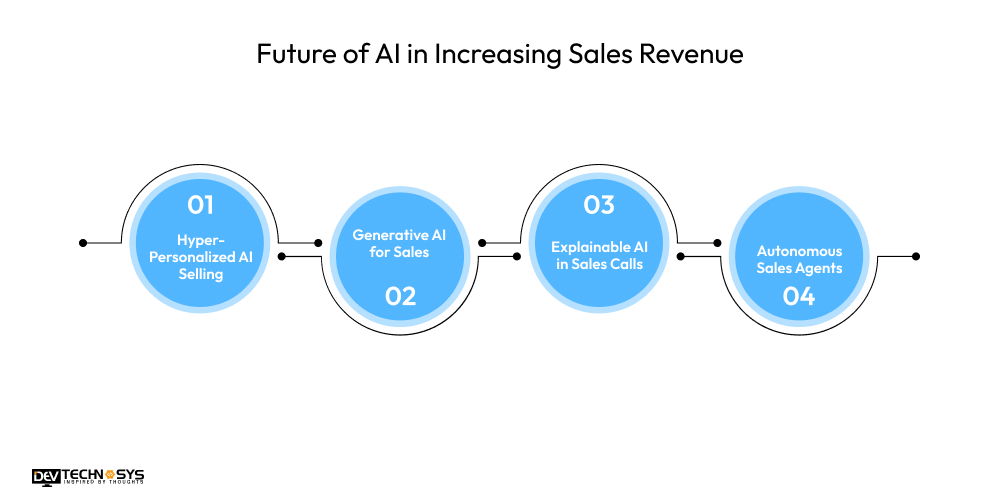
1. Hyper-Personalized AI Selling
AI uses enormous volumes of client data to provide highly customized product suggestions and sales pitches based on the interests of each individual customer. By giving prospects a sense of understanding and value, this strategy raises revenue of copilot AI and conversion rates.
2. Generative AI for Sales
Generative AI speeds up sales processes and fosters creativity by producing original material for emails, proposals, and presentations. This is the future of AI development that provides customized, on-demand messaging that speaks to the particular requirements and problems of every prospect.
3. Explainable AI in Sales Calls
Explainable AI helps salespeople understand why specific tactics or actions are recommended by offering transparency into AI-driven insights and recommendations during sales calls. As a result, decision-making becomes more assured and AI tools gain credibility.
4. Autonomous Sales Agents
AI sales software is used by autonomous sales representatives to qualify leads, manage daily interactions, and interact with prospects on their own without the need for human assistance. Because these machines can work around the clock, human representatives can concentrate on intricate, valuable interactions.
In a Nutshell!!
An AI Sales Copilot is the beginning of the new era in the sales and marketing industry. It is making processes streamlined and efficient for investors and production companies. As these tools use AI for predicting results and automating tasks, the terms are clear for entrepreneurs, that is to start investing in the development of a similar tool.
They must know the cost to build an Artificial Intelligence project, before investing money for the development. Once they have implemented this tool, revenue generation will become easy and may allow increment in the user traffic and retention.
FAQs
Q1. Why are AI Sales Copilots Popular?
AI Sales Copilots are popular because they increase productivity, simplify sales processes, and provide real-time actionable insights. By evaluating talks, rating leads, and suggesting next actions, they assist representatives in closing agreements more quickly.
Q2. How Does an AI Sales Copilot Improve Revenue Growth?
- AI identifies high-potential leads.
- Reduces time spent on manual tasks.
- Delivers data-driven recommendations.
Q3. Can an AI Sales Copilot Integrate with Existing Systems?
Yes, the majority of AI Sales Copilots are made to work in unison with CRM programs like Zoho, HubSpot, and Salesforce. Additionally, they use native plugins and APIs to link to calendar systems, email tools, and communication platforms.
Q4. Is it Secure to Use AI in Sales Processes?
Credible AI sales tools adhere to stringent data protection regulations, including CCPA and GDPR compliance. To protect sensitive client and company data, they employ secure APIs, access limits, and encryption. Data integrity is also ensured via cloud security and audit plans.
Q5. How Much Does an AI Sales Copilot Typically Cost?
Basic AI copilots are perfect for small to mid-sized teams and start at $30 to $50 per user per month. Advanced features, analytics, and support in enterprise-grade solutions can cost more than $100 per user per month. Premium modules, data use, and custom connectors can all affect the final cost.
Q6. What Types of Businesses can Benefit From an AI Sales Copilot?
- B2B Sales Teams: Helps in managing complex sales cycles.
- Ecommerce & SaaS Companies: Automates customer engagement.
- Service-Based Enterprises: Streamlines client follow-ups with customer retention.
